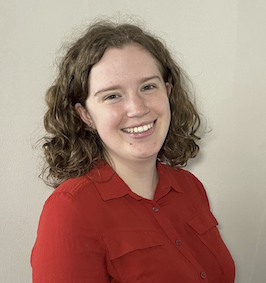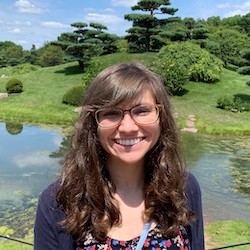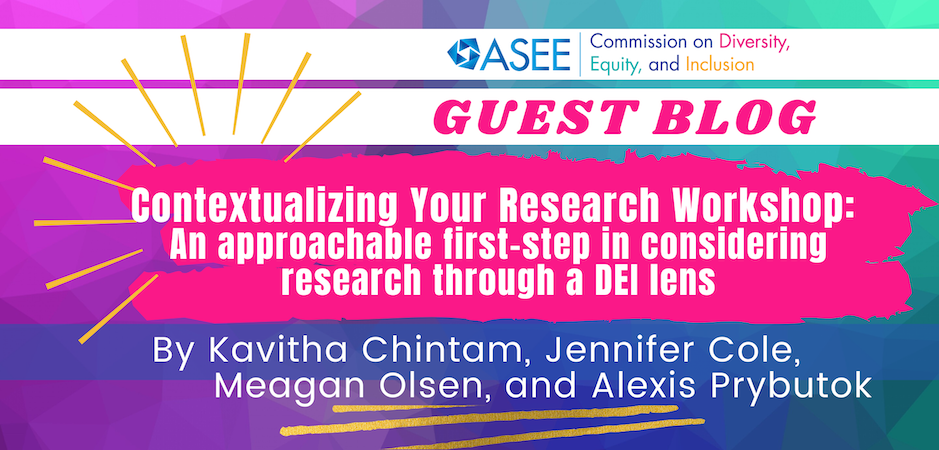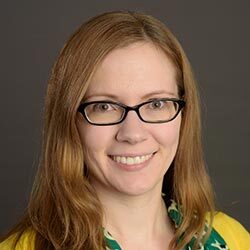Contextualizing Your Research Workshop: An approachable first-step in considering research through a DEI lens
Co-authors (alphabetical): Kavitha Chintam, Jennifer Cole, Meagan Olsen, and Alexis Prybutok
Creation of the Contextualizing Your Research Workshop catalyzed DEI efforts and engagement in our department.
The summer of 2020 was a reckoning for many as the visibility of the Black Lives Matter movement intensified and the COVID-19 pandemic further exposed systemic injustices and inequities. Members of primarily white institutions, those with both marginalized and privileged identities, were empowered to shake up the system in their local environments. At Northwestern University’s Department of Chemical and Biological Engineering, four graduate students banded together to push for change within the department. Many initiatives were proposed, but figuring out the appropriate first one was crucial to pave the way for future endeavors. Hence, both students and faculty agreed that the Contextualizing Your Research (CYR) Workshop was the way to proceed.
This workshop introduces the concept of research justice, facilitating conversations about research through a DEI lens. The main attractive features of a workshop are that it is brief, accessible, and can occur in a specified period of time. We also wanted an activity that would appeal to everyone in the department and would be accessible via the internet, since this was during the 2020 quarantine. The workshop, consisting of small breakout discussions of case studies exposing injustices in STEM research, enabled people of different backgrounds, positions, lab groups, and identities to discuss issues related to chemical engineering case studies and their social impacts. Perhaps most importantly, the workshop provided a low-barrier first step into issues of anti-racism, diversity, equity, and inclusion (ARDEI) as related to chemical engineering and research in general. We had a high participation rate within the department and received immensely positive feedback.
However, the workshop format offers another observation. We were working within the bounds of the academic system where time spent on DEI-related activities is rarely incentivized. This observation is crucial, as it lends to the truth that systemic change is needed to inherently center DEI in academic settings, rather than something to be forced into an already overwhelmed system.
The annual CYR Workshop is highly successful, and we continually modify the workshop to improve engagement and relevance.
Over the years, we worked to find a balance between the CYR Workshop and systemic changes needed to integrate DEI into research and academia. While the discussion of the STEM research case studies has been the most popular and consistent part of the workshop over the years, the workshop conclusion has become the most modified portion of the event. The workshop’s first iteration featured two distinct events: one day to discuss the case studies and another day for participants to apply the Free Radical’s Research Justice Worksheet to their own research. While both organizers and participants recognized the importance of these distinct sessions, the time asked to devote to the workshop was at odds with an academic system that values time spent on research over all else. Due to feedback from participants about the time commitment, the following two workshop iterations featured only a short 10-20 minute conclusion in which all participants shared brief summaries of their case studies and lessons learned. While this reduced the time commitment, participants were instead disappointed in the lack of connection to their own research.
For our fourth (and most recent) CYR Workshop, we attempted to strike a balance between the two seemingly incompatible requests—no additional time but additional content. To this end, we reevaluated the timing and content of our case studies to ensure those discussions could be completed in approximately 50 minutes. We then employed a Jigsaw-based activity in which participants joined new conclusion groups consisting of people from all four case studies. These new groups were given 30 minutes to briefly summarize their individual case studies and then work through key questions relating their research to the concepts learned in the case studies. This was the most successful conclusion format thus far, with the majority of post-workshop survey participants rating the conclusion component as “very helpful/informative” for the first time. The success of this format perhaps also reiterates the observation that graduate students, postdocs, faculty, and others involved in research often want to incorporate DEI principles into their work, but are not given the time nor opportunity to do so.
Workshop implementation required constant adaptation to the world around us. For the first three years, the CYR Workshop was held over Zoom due to social distancing and isolation requirements prompted by the COVID-19 pandemic. Only in 2023 did we host an in-person workshop. This shift from virtual to in-person required us to consider several new things in the workshop planning, including how to effectively moderate in the new environment, what sort of room to host in, and how to provide snacks for attendees. Unlike a Zoom meeting, moderators would not be able to remove the (very rare) disruptive participant from the breakout sessions with the click of a button. In addition to our standard anonymous form to report issues, we also had an “overall” moderator who did not facilitate a discussion group but instead monitored the event and was prepared to deal with any challenges. Luckily, we did not experience any issues, and rarely have over the years. Facilitators even reported that it was easier to facilitate in person because they could take into account body language to help ensure everyone got the chance to contribute to the discussion.
To realize the full impact of the workshop and other DEI efforts, the system in which we are asking people to do this work requires change.
Unfortunately, over the years, attendance at DEI workshops such as CYR has waned. Often those who attend the annual CYR Workshop are new department members. Not everyone attends multiple times despite the workshop having new case studies and content each year. We believe that learning about research justice is not a one-time action, but rather a continuous process that takes repeated effort and action. Through the years of running the CYR Workshop, the biggest takeaway is not necessarily that people don’t care about DEI, it is that the academic system does not incentivize its members to care, or in some cases with recent government policies, is actively hostile toward this kind of work.
At present, tenure for faculty or degree completion for graduate students requires primarily one thing: research, irrespective of whether that research is done through the lens of research justice. Tenure-track faculty at R1 institutions are told that their jobs are, generally speaking, around 40% research, 40% teaching, 20% service. It is already known that service is not equally distributed through all members of the faculty as women, people of color, and other individuals holding minority identities have a higher service load. Additionally, this service may or may not be related to DEI work, and often that which is related to DEI work is being done by faculty and trainees most impacted by the lack of DEI work being done.
Similarly, despite teaching being ostensibly the same fraction of the faculty job as research, extremely good or extremely poor teaching practices and evaluations will generally not make or break the decision of whether somebody earns tenure. High quality, equitable teaching may go unrewarded, and poor, harmful teaching may go unpunished. Faculty are incentivized to sacrifice more than 40% of their time, energy, and work into research, and anything that does not contribute to research outcomes—such as funding and publications—may feel like actively sacrificing tenure. If teaching, which is in the job description, is not equally valued, how could engagement with DEI work, which is not even required, be expected?
In a best case scenario, graduate students and faculty can care deeply about learning more about or actively fostering social justice in research, classroom, and work settings. However, the incentive structure of academia often requires those who engage with this work to either add DEI work on top of their existing, evaluated workload or sacrifice other work in favor of DEI. Engaged individuals either believe it is a benefit to their careers and/or the well being of others, choose to ignore that it may not benefit them directly, and/or understand that it may actively harm them if they are in a climate that is hostile toward DEI work.
Engagement with DEI work like the CYR Workshop, whether it be via participation on a department’s DEI Committee or by actively putting time into one’s own learning, growth, and practice of social justice concepts, needs to be further incentivized. Despite the moral desire to engage with DEI work to create more equitable environments for the health and safety of others and a plethora of research showing that more diverse and equitable environments increase success in the classroom and workplace, these incentives may not be enough in the cut-throat, research-centered world of academia. The only way to change this in the long run is to change the system—to incentivize and value quality DEI work as a true and equal part of the tenure process and the graduate student and postdoctoral trainee experience.
DEI work can be integrated throughout research, as well as teaching and service, and evidence toward integration into at least one if not all should be part of faculty and trainee evaluation and merit. There are many quantifiable ways to show growth, progress, and contribution to these areas: attending trainings and reflecting on learning outcomes, integrating new inclusive teaching practices into courses, analysis and improvement of the impact of one’s research on historically excluded communities, participating on and contributing positively to a DEI Committee, publishing DEI efforts with tangible impacts, and more. Not every faculty member needs to, or even should be, part of the DEI Committee, but showing steps toward learning and growth that become tangible actions is a good starting point for those newer to the process. We will continue to make these workshops and have participants learn from them, but for many they will continue to be a one-off event unless we can change the values of the system itself.
About the Authors
Authors are listed alphabetical by last name and contributed equally.
 Kavitha Chintam (she/her)
Kavitha Chintam (she/her)
Kavitha Chintam is a Ph.D. Candidate at Northwestern University in the Department of Chemical and Biological Engineering (ChBE). She is a co-founder and current co-chair of the ChBE Anti-Racism, Diversity, Equity, and Inclusion Committee and co-founder and a current facilitator of the Contextualizing Your Research Workshop.
LinkedIn: https://www.linkedin.com/in/kavichintam/
Twitter: https://twitter.com/thakavic
Dr. Jennifer Cole (she/her)
Jennifer Cole is the Assistant Chair in Chemical and Biological Engineering (ChBE) in the Robert R. McCormick School of Engineering and Applied Science at Northwestern University and the Associate Director of the Northwestern Center for Engineering Education Research. She is a member of the ChBE Anti-Racism, Diversity, Equity, and Inclusion Committee and a facilitator for the Contextualizing Your Research Workshop.
LinkedIn: https://www.linkedin.com/in/jennifer-cole-3207b79/
Twitter: https://twitter.com/ColeJY
 Meagan Olsen (she/her)
Meagan Olsen (she/her)
Meagan L. Olsen (she/her) is a Ph.D. student at Northwestern University in the Department of Chemical and Biological Engineering (ChBE). She is a member of the ChBE Anti-Racism, Diversity, Equity, and Inclusion Committee and the current initiative leader and a facilitator of the Contextualizing Your Research Workshop.
LinkedIn: https://www.linkedin.com/in/meagan-olsen-47895414a/
Twitter: https://twitter.com/MeaganLOlsen
 Dr. Alexis Prybutok (she/her)
Dr. Alexis Prybutok (she/her)
Alex Prybutok (she/her) is an Assistant Teaching Professor in the Department of Chemical Engineering at the University of Washington. She earned Ph.D. in Chemical Engineering from Northwestern University’s Department of Chemical and Biological Engineering (ChBE) in 2022. She is a co-founder of the ChBE Anti-Racism, Diversity, Equity, and Inclusion Committee and of the Contextualizing Your Research Workshop.
LinkedIn: https://www.linkedin.com/in/alexprybutok/
Twitter: https://twitter.com/alexprybutok
Do you want to become a guest blogger?
CDEI Guest Blog highlight future events, describe best practices, or share calls to action by CDEI members. We invite you to propose posts that share brief research highlights, reports of impactful initiatives, critical thought pieces, and resources you find useful. We especially encourage emerging scholars to share their work. If you are interested in sharing a blog or resource post, you may submit your proposal here. All posts are screened and edited.


